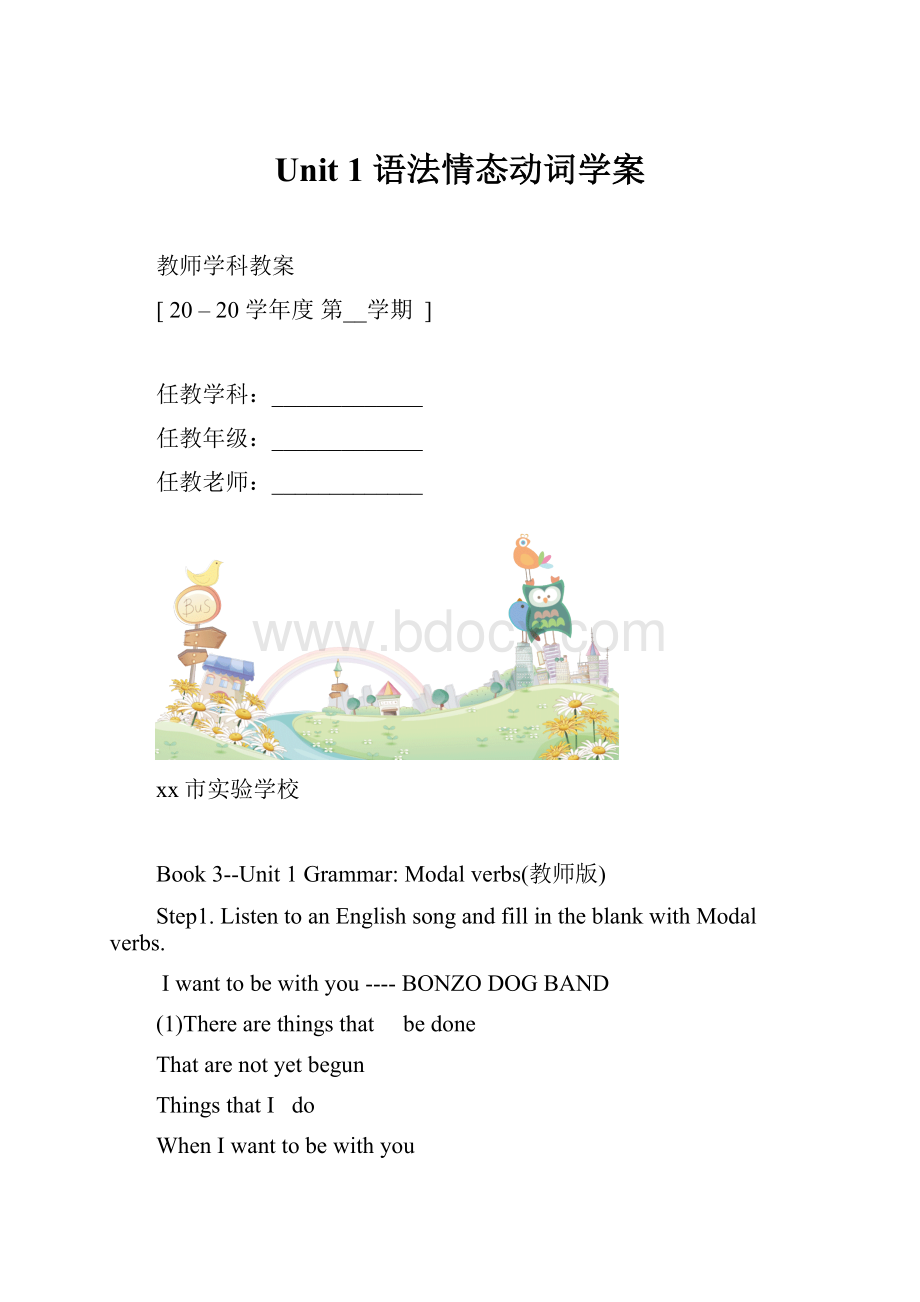Unit 1语法情态动词学案.docx
《Unit 1语法情态动词学案.docx》由会员分享,可在线阅读,更多相关《Unit 1语法情态动词学案.docx(9页珍藏版)》请在冰豆网上搜索。

Unit1语法情态动词学案
教师学科教案
[20–20学年度第__学期]
任教学科:
_____________
任教年级:
_____________
任教老师:
_____________
xx市实验学校
Book3--Unit1Grammar:
Modalverbs(教师版)
Step1.ListentoanEnglishsongandfillintheblankwithModalverbs.
Iwanttobewithyou----BONZODOGBAND
(1)Therearethingsthatbedone
Thatarenotyetbegun
ThingsthatIdo
WhenIwanttobewithyou
Althoughwe’refarapart
You’rewithmeinmyheart
Nooneelsedo
Ijustwanttobewithyou
(2)Iwanttobewithyou
youhearme?
Ineedyounearme
Iwanttobewithyou
Ineedyounearme,mylove
(3)Thetwoofusareone
Motherofmyson
Nooneelsedo
Ijustwanttobewithyou
(4)Iwanttobewithyou
youhearme?
Ineedyounearme
Iwanttobewithyou
Ineedyounearme,mylove
Step2.Explanationoftheuseofmodalverbs
一、情态动词的基本用法
情态动词表示说话人的预期或情绪,如可能、意愿、猜测、义务、需要等。
情态动词有以下特征:
1、情态动词有一定的词义,但不能,必须与其后的构成谓语;
2、情态动词没有的变化,即不随主语的不同而变化;
3、情态动词除ought和have外,后面只能接;
4、情态动词没有非谓语形式,即没有不定式、分词等形式。
5、但有些情态动词也有一般式和过去式的变化,如may/might,will/would,shall/should等。
情态动词的“时态”形式并不是时间区别的主要标志,不少情况下,情态动词的现在形式和过去形式都可以用来表示现在时间、过去时间和将来时间。
e.g.,1)Hecan’tfinishhisessaybythistime.现在他不可能写完论文。
2)Youmayusemydictionary.你可以用我的字典。
3)Wemuststudyhardandmakeprogresseveryday.我们必须好好学习,天天向上。
二、用法归纳
1.canandcould
Lookatthesentencesandsumuptheusageofthemodalverbs.
1)CanyouspeakJapanese?
2)Hecan’tbeathomenow.
3)Can/CouldIhavealook?
4)Howcanyoubesorude?
5)Canyouliftthisheavybox?
6)Canthisbetrue?
7)Thiscan’tbedonebyhim.8)Itcouldbeveryinterestingtogooutforadrive.
归纳1:
canandcould
(1)表示,,常译为“能,会”如例句。
(2)表示对现在或过去情况的时,只用在否定句或疑问句中,如例句。
(3)表示(在陈述句中属于“”,在疑问句中属于“”),常译为“可以”,如例句。
(4)用于否定句、疑问句中,表示等,如例句。
(5)用于肯定的陈述句中,表示理论上的可能性,也可表示一时的情况,如例句。
could可表示,多用于过去,也可指现在,通常表示虚拟或作为的委婉形式。
e.g.,Can/CouldIuseyourcellphone?
我可以用用你的手机吗?
2.mayandmight
Lookatthesentencesandsumuptheusageofthemodalverbs.
1)Itmaybetrue.2)MayIaskyouaquestion?
3)Mayyoubehappyallyourlife.4)Mayyousucceed!
5)Hemay/mightbeverybusynow.6)Yourmothermay/mightnotknowthetruth.
归纳2:
mayandmight
(1)表示,常用于肯定和否定句中,如例句。
(2)表示(在陈述句中属于“”,在疑问句中属于“”),常译成“可以”,如例句。
表示“”时,might比may语气更委婉,类似could/与can。
对其一般疑问句的肯定回答可用may或can,但要作出否定回答时要用。
mustn’t表示“不可以,不许”。
(3)用于祈使句,表示,如例句。
(4)might比may语气更委婉
may/might表示时,表示对现在或将来要发生的事情把握不大,如例句。
might/mayhavedone表示对过去发生的动作进行的。
e.g.,1)Hemayhavegonetotheclinic.他可能去医务室了。
2)Hemighthavereadaboutthenewsinthenewspaper.他可能已经从报纸上知道这个消息了。
3.willandwould
Lookatthesentencesandsumuptheusageofthemodalverbs.
1)Will/Wouldyoupleaseposttheletterforme?
2)Gowhereyouwill.
3)SheaskedifIwouldgowiththem.4)Oilwillfloatonwater.
5)Askhim.Hewillknow.6)Whenhewasachild,hewouldoftengoskiing.
7)Everyfamilywouldhavesomesortoftrouble.
归纳3:
willandwould
(1)表示意愿,will表示,would表示,如例句。
(2)表示,主要用于第二人称的疑问句中,will和would均可用,would此时并不表过去,而表示,如例句1。
(3)表示,will表示现在的习惯,would表示过去的习惯,如例句。
(4)表示,will用于谈论现在,would可用于谈论过去,也可用于谈论现在(语气较委婉),如例句。
4.shallandshould
Lookatthesentencesandsumuptheusageofthemodalverbs.
1)YoushalldoasIsay.2)ShallIopenthewindowforyou?
3)Nothingshallstopmedoingit.4)Youngpeopleshouldlearnhowtousecomputers.
5)Tellhimthatheshallhavethebooktomorrow.6)Shallhefetchsomewaterforyou?
7)Theyleftat5:
30.Theyshouldgettherenow.8)Youshouldhavetoldherthetruthearlier.
归纳4:
shallandshould
(1)在陈述句中,shall用于二、三人称表示、、、等,如例句。
(2)在疑问句中,用于一、三人称,用来表示。
如例句。
(3)should常表示、、。
如例句。
(4)shouldhavedone表示,意为“本应该…但”,如例句。
(5)should用于时,表“应该,很可能”,如例句。
5.mustandcan’t
Lookatthesentencesandsumuptheusageofthemodalverbs.
1)Hemustbereadingthenovelnow.2)Youmustn’tsmokehere.
3)Itcan’tbetrue.4)Youmustgotoseethefilm.
5)Youmusthandinyourhomeworktoday.6)Itisallwetontheground.Itmusthaverainedlast.
7)Hecan’thavebeenathomelastnight,forthelightwasn’ton.
归纳5:
mustandcan’t
(1)must可以表示。
“must+动词原形”表示现在或经常发生的情况作。
作此意讲时,must的否定形式不是,而是,如例句。
(2)mustn’t表示“不允许,禁止”,如例句。
(3)must表示,多处于义务、责任或强制命令,如例句。
must表示“必须”,用于一般疑问句中,肯定回答用,否定回答用.
e.g.,--Mustwehandinourhomeworktoday?
我们今天必须交作业吗?
--Yes,youmust.是的,你们必须。
/No,youneedn’t/don’thaveto.不,你们不必。
(4)must表示,如例句4。
(5)musthavedone表示对,如例句。
can’thavedone表示对,如例句。
Step3.巩固练习
(1)从每题所给的A、B、C、D四个选项中,选出可以填入空白处的最佳选项。
1)—Youneedn’ttakeanumbrella.Itisn’tgoingtorain.
—Well,Idon’tknow.It_______do.
A.mightB.needC.wouldD.should
2)Sincenobodygavehimanyhelp,he_______havedonetheresearchonhisown.
A.canB.mustC.wouldD.need
3)He_______sleep,althoughhetriedto,whenhegotonsuchahuntforanideauntilhehadcaughtit.
A.wouldn’tB.shouldn’tC.couldn’tD.mustn’t
4)─_____youinterruptnow?
Can’tyouseeI’monthephone?
─SorrySir,butit’surgent.
A.CanB.ShouldC.MustD.Would
5)Oneofourrulesisthateverystudent
_____wearschooluniformwhileatschool.
A.mightB.couldC.shallD.will
6)IgotcloseenoughtohearthemspeakingChinese,andIsaid“NiHao,”justasI_____doinChina.
A.mustB.mightC.canD.should
7)I______thankyoutoomuchforallyourhelptomysonwhilewewereawayfromhome.
A.won’tB.can’tC.canD.will
8)—ShallIinformhimofthechangeoftheschedulerightnow?
—Iamafraidyou_______,incasehecomeslateforthemeeting.
A.willB.mustC.mayD.can
9).—Idon’treallylikeJames.Whydidyouinvitehim?
—Don’tworry.Hecome.Hesaidhewasn’tcertainwhathisplanswere.
A.mustnotB.neednotC.wouldnotD.mightnot
10)Jackdescribedhisfather,who____abraveboymanyyearsago,asastrong–willedman.
A.wouldbeB.wouldhavebeenC.mustbeD.musthavebeen
Keys:
1-5:
ABCCC6-10:
BBBDD
(2)Exercise2onpage5inyourtextbook.
Step4.Homework
(1)从句子后面的括号中选择适当的情态动词填空。
1.You______helphimbecauseyouarehisbestfriend.(could,should)
2.He______sitlikethatforhourswhenhewasintrouble.(will,would)
3.She______driveacar,butsometimesshegoestoschoolbybus.(can,could)
4.Lisasaidthere______beafewmagazinesinthatlibrary,butshewasnotsureyet.(may,might)
5.—DoesJackgotoworkbybus?
—Heshould,buthe_______not.Helikestogotoworkonfoot.(may,can)
6.You______betired.Youhavebeenworkingforonlyonehour.(mustn’t,can’t)
7.—_______Iputawayyournotebookanduniformforyou?
(Shall,Should)
—Yes.Thankyou.
8.Mary______havebeenwellpreparedfortheexam,forshegotfullmarksinit.(may,must)
(2)从每题所给的A、B、C、D四个选项中,选出可以填入空白处的最佳选项。
1)Ashehadheartattack,hewastoldthathe____continuethework.
A.needn'tB.maynotC.mustn'tD.can't
2)AnEnglishmanwho____notspeakItalianwasoncetravelinginItaly.
A.mustB.couldC.mayD.might
3)I____liketomakeasuggestion.
A.couldB.wouldC.mustD.might
4)Iknowthingsarehardwithyou,butyou____trytogetoverthedifficulties.
A.canB.mayC.mustD.ought
5)Wehopethatasmanypeopleaspossible_____joinusforthepicnictomorrow.
A.mayB.must C.shouldD.can
6)—IthinkI’llgiveBobaring.
—You_____.Youhaven’tbeenintouchwithhimforages.
A.willB.may C.wouldD.should
7.—CouldIhaveawordwithyou,Mum?
—Ohdear,ifyou______.
A.canB.must C.mayD.should
8.ItisusuallywarminmyhometowninMarch,
butit_____berathercoldsometimes.
A.mustB.canC.shouldD.would
Keys:
CBBCDDBB